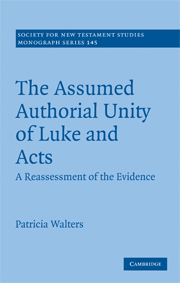Book contents
- Frontmatter
- Contents
- List of figures
- Acknowledgments
- List of abbreviations
- 1 Background and methodology
- 2 Authorial data: seams and summaries
- 3 Authorial criteria: Greek prose compositional conventions
- 4 Authorial unity: analysis results and probabilities
- 5 Final considerations and future directions
- Appendix
- Bibliography
- Index of Biblical and Other Ancient Sources
- Index of Modern Authors and Subjects
- References
5 - Final considerations and future directions
Published online by Cambridge University Press: 24 June 2009
- Frontmatter
- Contents
- List of figures
- Acknowledgments
- List of abbreviations
- 1 Background and methodology
- 2 Authorial data: seams and summaries
- 3 Authorial criteria: Greek prose compositional conventions
- 4 Authorial unity: analysis results and probabilities
- 5 Final considerations and future directions
- Appendix
- Bibliography
- Index of Biblical and Other Ancient Sources
- Index of Modern Authors and Subjects
- References
Summary
Among the writings of the New Testament one book occupies a special place, a fact which often receives too little attention. This is the Book of Acts, which tradition attributes to Luke, the author of the third Gospel; there are some things to be said against this tradition, but far more in favour of it, so that we may call the author by the name of Luke [emphasis added].
Final considerations
The authorial unity of Luke and Acts is little argued in scholarly circles, since virtually everyone unanimously agrees the external and internal evidence confirm single authorship. That the external evidence is from the latter part of the second century and beyond or that the internal evidence tends to favor similarities over differences does not receive much attention.
The current project was undertaken to re-examine the evidence for the authorial unity of Luke and Acts by analyzing their seams and summaries in light of ancient prose composition criticism and modern stylometric methods. The statement to be tested may be expressed thus: If the common authorship of Luke and Acts is true, their seams and summaries, genre-neutral text, will reveal the same or similar prose compositional features. If differences of a statistically significant or highly significant nature are discovered, single authorship may, or better, must, be called into question. Given this, a three-stage analysis evolved as the most appropriate methodological approach.
- Type
- Chapter
- Information
- The Assumed Authorial Unity of Luke and ActsA Reassessment of the Evidence, pp. 190 - 196Publisher: Cambridge University PressPrint publication year: 2009



